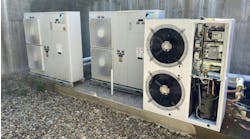BOSTON — This fall, the Energy Star program will increase the minimum Energy Factor (EF) for gas storage water heaters from 0.62 to 0.67. The increase in criteria, which will go into effect on Sept. 1, 2010, will bring additional 0.67 EF models to the marketplace, offering homeowners even greater water heating efficiency.
“Energy Star seeks to keep its product criteria relevant by keeping pace with changing technologies in the marketplace,” said Steve Ryan, with the Energy Star program at the Environmental Protection Agency. “In a recent poll, 77% of people are aware of the Energy Star label and see the value in it. We work to keep the brand meaningful by making sure it continues to indicate cost effective savings with no loss of amenity. Storage water heaters are becoming more efficient, and this change recognizes that fact.”
Water heaters that meet the increased criteria offer homeowners significant savings in gas consumption even when compared to today’s 0.62 EF models, providing up to 14% greater savings than a conventional gas model. According to Energy Star calculations, 0.67 EF models only consume 224 therms per year. Gas storage heaters with a 0.62 EF consume 242 therms annually, saving up to 7.3% more than a conventional model.
Several gas storage heaters with a 0.67 EF are currently available, including many new products recently developed in preparation for the upcoming change. There are also a number of other water heater models that carry the Energy Star label, including electric heat pump, solar thermal and tankless units. Sponsors of the Coalition for Energy Star Water Heaters — A. O. Smith, Bradford White, Rheem and Rinnai — offer many of these models.
Plumbers can check with their distributors and local utilities on the availability of new 0.67 EF gas storage models and rebate offers in their area. Additional information on local utility rebates and other water heating efficiency news is available at www.eswaterheaters.org.
CEE is a consortium of efficiency program administrators from the U.S. and Canada that unifies program approaches across jurisdictions to increase impact in fragmented markets. By joining forces at CEE, individual electric and gas efficiency programs are able to partner not only with each other, but also with other industries, trade associations, and government agencies. Additional information is available at www.cee1.org.
Energy Star is a joint program of the U.S. Environmental Protection Agency and the U.S. Department of Energy that aims to save money and protect the environment through energy efficient products and practices. Today, the Energy Star label can be found on more than 50 different kinds of products, new homes, and commercial and industrial buildings. Products and buildings that have earned the Energy Star designation prevent greenhouse gas emissions by meeting strict energy efficiency specifications. In 2007 alone, Americans, with the help of the Energy Star program, saved about $16 billion on their energy bills while reducing greenhouse gas emissions equivalent to 27 million vehicles.
Latest from Hydronics
Latest from Hydronics
Chilled Water Rescue: a Struggle with Humidity
April 11, 2024
Voice your opinion!
Voice your opinion!
To join the conversation, and become an exclusive member of Contractor, create an account today!
Sponsored Recommendations
Sponsored Recommendations

